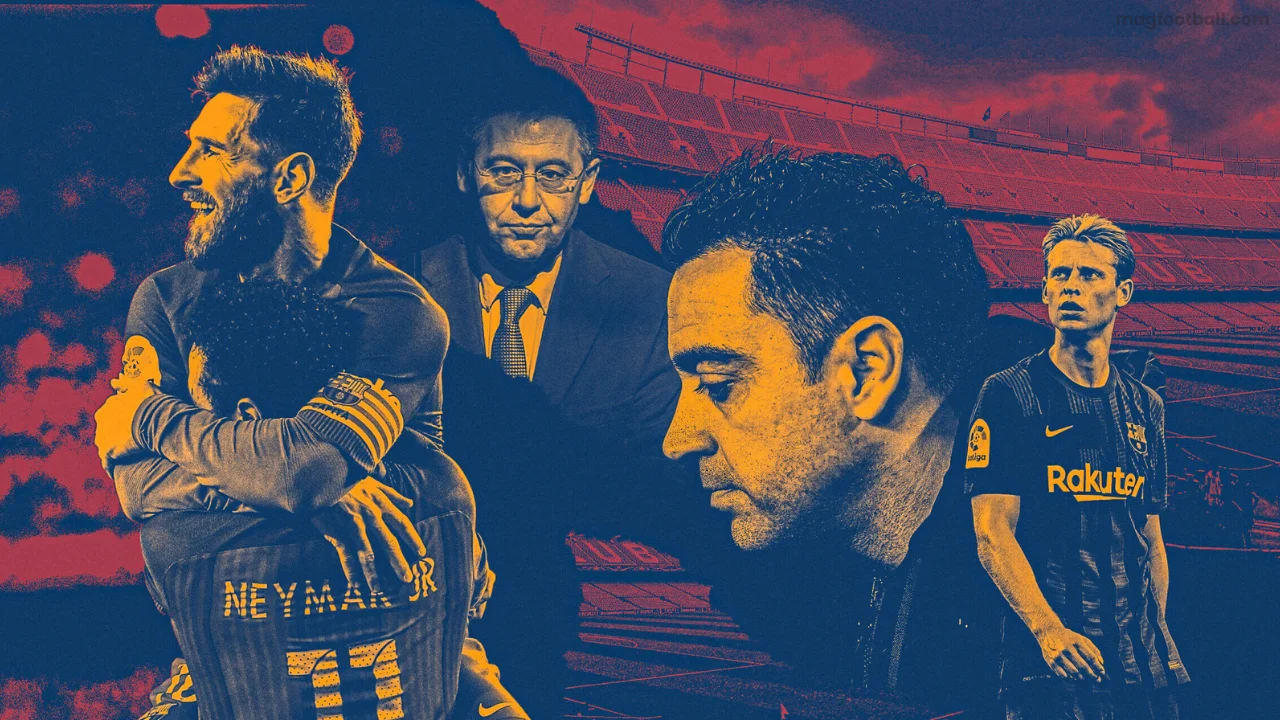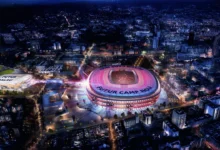FC Barcelona’s Financial Crisis: How the Club is Navigating Its Debt and Future

FC Barcelona, one of the most successful and celebrated football clubs in the world, has found itself in a financial crisis that threatens its future. Once known for its lavish spending and star-studded squads, the club is now burdened with significant debt. The financial challenges have forced the club to rethink its approach, including transfer strategies, player salaries, and long-term investments. In this article, we will explore how FC Barcelona is navigating its financial crisis, the reasons behind its massive debt, and what the future holds for the Catalan giants.
Table of Contents
The Roots of Barcelona’s Financial Crisis
Barcelona’s current financial woes are the result of several factors that accumulated over time, leading to a staggering €1.35 billion debt as of 2021. Key contributors to this debt include:
- Exorbitant Player Salaries: Barcelona’s wage bill was among the highest in the football world, with superstar players like Lionel Messi and Antoine Griezmann earning astronomical sums. By the 2020-2021 season, wages accounted for more than 70% of the club’s revenue.
- Costly Transfers: The club’s pursuit of high-profile players such as Philippe Coutinho, Ousmane Dembélé, and Antoine Griezmann came with hefty transfer fees that exceeded €400 million combined. These transfers, coupled with poor performances and injuries, failed to justify their costs.
- COVID-19 Pandemic: The global pandemic hit football clubs hard, but for Barcelona, the impact was even more severe. The club’s reliance on matchday revenue and tourism-related income from its iconic stadium, the Camp Nou, meant a significant drop in earnings during lockdowns.
- Mismanagement: Under former president Josep Maria Bartomeu, the club was criticized for financial mismanagement and lack of foresight. Poor decisions regarding player contracts, sponsorships, and investments further deepened the club’s financial issues.
Navigating the Debt: Barcelona’s Response
To mitigate the debt crisis, Barcelona has implemented several strategies aimed at reducing costs, increasing revenue, and regaining financial stability.
1. Salary Reductions and Player Departures
One of the first actions taken by the club was to cut the wage bill. In August 2021, Lionel Messi’s departure to Paris Saint-Germain (PSG) was a direct consequence of the club’s inability to meet La Liga’s salary cap. While Messi’s exit was a heartbreaking moment for Barcelona fans, it significantly reduced the club’s financial burden.
The club also renegotiated contracts with several players, including Gerard Piqué, Jordi Alba, and Sergio Busquets, to reduce their salaries. Additionally, they offloaded high-earning players like Antoine Griezmann, who returned to Atlético Madrid.
2. Transfer Strategy Overhaul
With a new approach to the transfer market, Barcelona has shifted its focus from expensive signings to more financially sustainable options. The club is now targeting free agents, loan deals, and young talents from La Masia, Barcelona’s famed youth academy.
The signings of players like Memphis Depay and Eric García on free transfers reflect this new approach. The club is also looking to promote promising young players like Pedri, Ansu Fati, and Gavi, who are seen as the future of Barcelona and crucial to its revival.
3. Sponsorships and Commercial Deals
To increase revenue, Barcelona is leveraging its global brand by securing sponsorship deals and expanding its commercial operations. In 2022, Barcelona signed a massive sponsorship agreement with Spotify, which became the club’s new shirt and stadium sponsor, renaming the stadium to Spotify Camp Nou.
This deal, estimated to be worth €280 million, is a significant financial boost and demonstrates the club’s ability to attract major global brands despite its current challenges.
4. Camp Nou Renovation and the Espai Barça Project
Another key element in Barcelona’s financial recovery plan is the Espai Barça project, a massive renovation and expansion of the Camp Nou and its surrounding facilities. While the project was initially delayed due to financial concerns, the club views it as a long-term investment that will increase matchday and tourism revenue.
The renovation is expected to generate additional revenue streams through improved hospitality services, premium seating, and enhanced fan experiences. Once completed, the new Spotify Camp Nou will be one of the most modern and profitable stadiums in the world.
5. Financial Support from La Liga’s CVC Deal
To further stabilize its finances, Barcelona received funding from La Liga’s agreement with CVC Capital Partners, a private equity firm. Under the terms of the deal, La Liga clubs received an influx of cash in exchange for a percentage of their future TV rights revenue.
While controversial, the deal provided immediate financial relief to Barcelona and allowed the club to address some short-term liquidity issues.
The Future of FC Barcelona: Challenges and Opportunities
Barcelona’s financial crisis has forced the club to rethink its traditional methods of operating. However, despite the challenges, there are signs of optimism for the future. The emergence of young stars like Pedri, Ansu Fati, and Gavi offers hope that Barcelona can rebuild from within, while the club’s commitment to financial responsibility will be crucial for long-term sustainability.
The Road Ahead: Financial Responsibility and Youth Development
The club’s board, led by president Joan Laporta, has emphasized the importance of financial responsibility moving forward. Instead of relying on expensive marquee signings, Barcelona will focus on developing young players through La Masia and making smart, strategic signings.
Reclaiming European Dominance
For Barcelona, returning to the top of European football will require both financial discipline and on-field success. Competing with well-funded clubs like Manchester City and Paris Saint-Germain will not be easy, but Barcelona’s rich history, global fanbase, and talented youth academy give it a competitive edge.
Conclusion: Barcelona’s Path to Recovery
Barcelona’s financial crisis is undoubtedly a defining moment in the club’s history. With a debt that once seemed insurmountable, the club has had to make difficult decisions, including the departure of Lionel Messi, to stabilize its finances. However, through a combination of wage cuts, a revamped transfer strategy, and smart commercial deals, Barcelona is taking significant steps toward recovery.
While the road ahead is still long and filled with challenges, the club’s commitment to financial responsibility, coupled with the development of young talent, offers hope for the future. As Barcelona continues to navigate its debt, the club remains determined to return to the top of European football, not just as a financial powerhouse, but as a team capable of winning major trophies once again.



